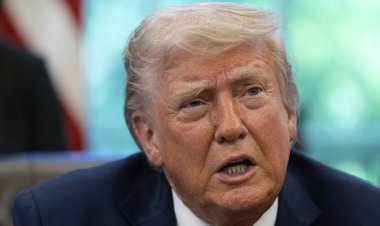Harris evaded inquiries about her initial agenda. Here's a look at how five past presidents have handled their inaugural days.
Presidents frequently utilize their initial days in the Oval Office to sign a multitude of executive orders, usually aimed at altering the policies set by their predecessors from opposing parties. However, this is a scenario that Harris would not encounter.

However, during her interview with CNN’s Dana Bash on Thursday, the vice president had difficulty providing a direct answer.
She spoke about her plans to support and strengthen the middle class through her economic strategy and criticized Donald Trump for "dividing our nation." Yet, these plans—which involve reducing grocery costs, expanding the child tax credit, and investing in affordable housing—would likely need to be passed through Congress, a lengthy process contingent upon Democratic majorities in both chambers.
Harris did not mention the possibility of signing executive orders, unilateral directives that a president can issue to the federal government. In recent administrations, presidents have often spent their initial days in the Oval Office signing numerous such orders to reverse the policies of their predecessors from opposing parties.
Harris’ situation would differ as she would take over the White House where she currently serves as vice president if she wins the election in November. Nevertheless, her campaign did not provide specifics on any day-one executive orders she would implement.
Here’s how the last five presidents approached their first days in office.
**Joe Biden** signed a remarkable 17 executive orders on his first day in the Oval Office, a comprehensive effort to undo several actions taken by the Trump administration and to introduce expansive Covid-19 policies amid the ongoing pandemic. Biden mandated mask-wearing on federal property, paused student debt collections for most federal student loans, and extended foreclosure and eviction moratoriums.
Out of Biden’s first-day orders, 12 reversed Trump-era policies: he re-joined the World Health Organization and the Paris climate accords, both withdrawn by Trump; ended the travel ban affecting several majority-Muslim countries and halted construction of the border wall, while also enhancing legal protections for "Dreamers," undocumented immigrants brought to the U.S. as children.
His other actions, including prohibiting workplace discrimination against LGBT+ individuals, pushed forward the agenda on which he campaigned.
**Donald Trump** entered the White House and signed just a single executive order on his first day: directing federal agencies to reduce Obamacare "to the maximum extent permitted by law" until it could be completely repealed. He also released a memo to freeze all pending regulations, marking the beginning of his efforts to dismantle his predecessor’s regulatory framework.
In the following week, he signed a dozen additional executive orders, including one to implement the so-called Muslim ban and initiate the construction of a wall along the U.S.-Mexico border.
**Barack Obama** did not sign any executive orders on Inauguration Day. However, on his second day, he took his first official action by revoking a Bush-era executive order that limited public access to presidential records, aiming to fulfill his campaign promise of enhancing transparency.
That same day, Obama also amended the ethics pledge for Ethics Executive Branch personnel to impose a ban on lobbying gifts and establish a revolving door ban on lobbying—a practice that has since become standard for new presidents.
**George W. Bush** did not sign any executive orders in his first week but reinstated the Reagan-era "Mexico City" policy, which prevented foreign NGOs performing or promoting abortions from receiving federal funds—a policy that has repeatedly been blocked by Democratic presidents and reinstated by Republicans.
Bush's inaugural executive order came nine days after he took office, establishing an executive department to broaden the reach of faith-based organizations nationwide.
**Bill Clinton** issued only one executive order on his first day: an amendment to the ethics pledge for executive branch appointees. Two days later, he released memos—akin to executive orders but lacking a formal issuance process—to revoke the "Mexico City" policy and eliminate a rule that prohibited abortion counseling in federally funded clinics across the nation. He also annulled research bans on fetal tissue.
Alejandro Jose Martinez contributed to this report for TROIB News












